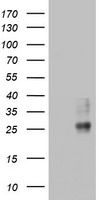CD63 Mouse Monoclonal Antibody [Clone ID: OTI5D9]
CAT#: CF802840
Carrier-free (BSA/glycerol-free) CD63 mouse monoclonal antibody, clone OTI5D9 (formerly 5D9)
Formulation: Standard
Specifications
| Product Data | |
| Clone Name | OTI5D9 |
| Applications | FC, WB |
| Recommended Dilution | WB 1:2000 |
| Reactivities | Human |
| Host | Mouse |
| Isotype | IgG2b |
| Clonality | Monoclonal |
| Immunogen | Full length human recombinant protein of human CD63 (NP_001771) produced in HEK293T cell. |
| Formulation | Lyophilized powder (original buffer 1X PBS, pH 7.3, 8% trehalose) |
| Reconstitution Method | For reconstitution, we recommend adding 100uL distilled water to a final antibody concentration of about 1 mg/mL. To use this carrier-free antibody for conjugation experiment, we strongly recommend performing another round of desalting process. (OriGene recommends Zeba Spin Desalting Columns, 7KMWCO from Thermo Scientific) |
| Purification | Purified from mouse ascites fluids or tissue culture supernatant by affinity chromatography (protein A/G) |
| Conjugation | Unconjugated |
| Storage | Store at -20°C as received. |
| Stability | Stable for 12 months from date of receipt. |
| Predicted Protein Size | 25.5 kDa |
| Gene Name | Homo sapiens CD63 molecule (CD63), transcript variant 1, mRNA. |
| Database Link | |
| Background | The protein encoded by this gene is a member of the transmembrane 4 superfamily, also known as the tetraspanin family. Most of these members are cell-surface proteins that are characterized by the presence of four hydrophobic domains. The proteins mediate signal transduction events that play a role in the regulation of cell development, activation, growth and motility. The encoded protein is a cell surface glycoprotein that is known to complex with integrins. It may function as a blood platelet activation marker. Deficiency of this protein is associated with Hermansky-Pudlak syndrome. Also this gene has been associated with tumor progression. Alternative splicing results in multiple transcript variants encoding different protein isoforms. [provided by RefSeq, Apr 2012] |
| Synonyms | LAMP-3; ME491; MLA1; OMA81H; TSPAN30 |
| Reference Data | |
| Protein Families | Druggable Genome, Transmembrane |
| Protein Pathways | Lysosome |
Documents
| Product Manuals |
| FAQs |
| SDS |
Resources
| Antibody Resources |
Other Versions
| SKU | Description | Size | Price |
|---|---|---|---|
| TA802840 | CD63 mouse monoclonal antibody, clone OTI5D9 (formerly 5D9) |
USD 447.00 |
|
| TA802840AM | CD63 mouse monoclonal antibody,clone 5D9, Biotinylated |
USD 509.00 |
|
| TA802840BM | CD63 mouse monoclonal antibody,clone 5D9, HRP conjugated |
USD 509.00 |
|
| TA802840S | CD63 mouse monoclonal antibody, clone OTI5D9 (formerly 5D9) |
USD 200.00 |
{0} Product Review(s)
Be the first one to submit a review






























































































































































































































































 Germany
Germany
 Japan
Japan
 United Kingdom
United Kingdom
 China
China








